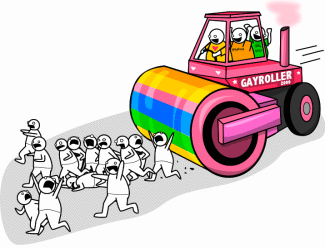by Matthew Inman of the Oatmeal
NOTICE: THIS WORK MAY BE PROTECTED BY COPYRIGHT
YOU ARE REQUIRED TO READ THE COPYRIGHT NOTICE AT THIS LINK BEFORE YOU READ THE FOLLOWING WORK, THAT IS AVAILABLE SOLELY FOR PRIVATE STUDY, SCHOLARSHIP OR RESEARCH PURSUANT TO 17 U.S.C. SECTION 107 AND 108. IN THE EVENT THAT THE LIBRARY DETERMINES THAT UNLAWFUL COPYING OF THIS WORK HAS OCCURRED, THE LIBRARY HAS THE RIGHT TO BLOCK THE I.P. ADDRESS AT WHICH THE UNLAWFUL COPYING APPEARED TO HAVE OCCURRED. THANK YOU FOR RESPECTING THE RIGHTS OF COPYRIGHT OWNERS.
Loughner’s rambling Internet missives, says Mark Potok of the Southern Poverty Law Center, likely come from well known online sources of the radical right. Potok, who studies hate groups and hate speech, has combed Loughner’s sites and says his material on grammar, in particular, likely comes from the writings of the Milwaukee-based, far right activist David Wynn Miller. As Potok explains it, Miller “believes in a ‘truth language’ that can throw off the government. If you use the right combination of colons and hyphens you don’t have to pay taxes. Miller is virtually the only person who pushes these ideas on grammar, it’s a very unusual idea, even on the radical right.”
-- Jared Lee Loughner's Mental State, by the Daily Beast
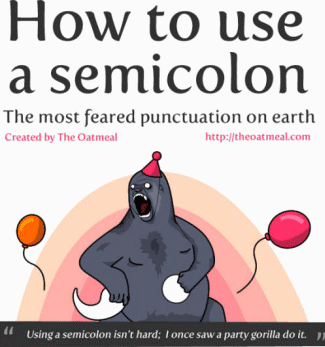
How to use a semicolon
The most feared punctuation on earth
Created by The Oatmeal
"Using a semicolon isn't hard; I once saw a party gorilla do it."
Why
What's the point of a semicolon?
The most common way to use a semicolon is to connect two independent clauses. For example:
"The ice cream truck man drove by my house today. He had big hairy knuckles."
The two statements are separated by a period. If read aloud, it would go something like this:
"The ice cream truck man drove by my house today. *take a breath* He had big hairy knuckles."
With a semicolon, however, it would sound like this:
"The ice cream truck man drove by my house today; he had big hairy knuckles."
Basically what we did was eliminate the pause between the two statements without using words such as and, but, nor, or yet.
How
How do I use a semicolon?
If you have two independent clauses, meaning they could stand alone as their own sentences, it's ok to use a semicolon. For example:
"My aunt also had hairy knuckles; she loved to wash and comb them."
This is an independent clause, meaning it could stand alone as a complete sentence.
This is also an independent clause, it could exist without being attached to its predecessor.
Don't
Don't use it with conjunctions.
Conjunctions are words like and, but, or, nor, for, so and yet.
"My aunt's hairy knuckles are magnificent indeed, but I have no desire to stroke them."
A comma is used because there's a but separating the two clauses.
When
When should I use a semicolon?
"I gnaw on old car tires; it strengthens my jaw so I'll be better conditioned for bear combat."
Use a semicolon when you want to form a bond between two statements, typically when they are related to or contrast with one another. In the example above, the relationship between gnawing on tires and combatting bears is strengthened by using a semicolon.
"I fought the bear and won. Also, I never kiss plague rats on the mouth."
In this sentence, your victory against the bear does not need to be connected to the plague rat, so a period is used.
Pause
Both bears and semicolons have pause.
Comma (brief pause)
Semicolon (moderate pause)
Period (complete stop)
Internal
Use a semicolon to connect sentences that contain internal punctuation.
[Dinosaur 1] I've got all these commas! How can we ever be together without forming a run-on sentence?
[Dinosaur 2] Nothing can stop true love. Use a semicolon, you fool!
"When dinosaurs agree on something, they'll often high five one another; dinosaurs are all about high fives."
If you'd used a comma in this sentence it would have resulted in a comma splice. If you'd used a period you'd lose the connection between the two clauses.
Super
Use a semicolon as a super-comma.
"While searching for a good place to get a unicorn burger, I traveled to Seattle, Washington; Tokyo, Japan; and London, England.
Use a semicolon if you need to make a list of items that are separated with a comma. This often occurs when listing locations, names, dates, and descriptions.
The most enchanting meat on earth comes from the thighs of a unicorn.
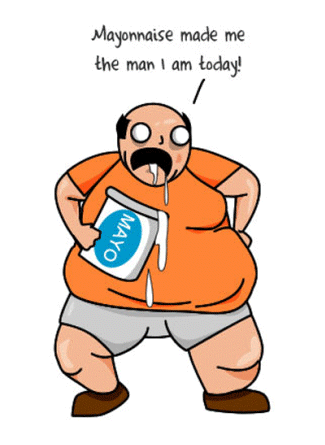
[Fat Man] Mayonnaise made me the man I am today!
"My favorite people include Samuel Slaughterjaws, a famous unicorn hunter; my uncle Wilford, a world champion at mayonnaise eating contests; and Nikola Tesla, the most awesome dude to ever fire a lightning bolt at an angry peasant."
The semicolon enables you to list and describe all three characters in the same sentence.
The end.
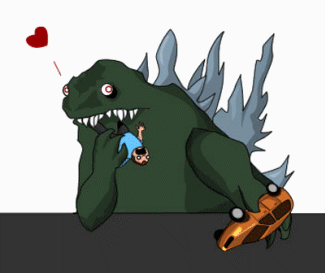
"Godzilla is a misunderstood creature; beneath his raging desire to set people on fire and eat them lies a gentle giant who just wants to cuddle."
***
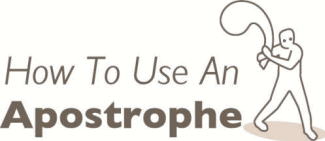
http://theoatmeal.com/comics/apostrophe
How to Use an Apostrophe
Is it plural?
Plural means more than one.
I saw two kittens riding a goat. Goats are great for transportation.
DON'T use an apostrophe
Two Exceptions
Is it a single letter word? For example: There are two t's in "kittens." Then its ok, but you can also do this: There are two "t"s in "kittens."
Is it a number or abbreviation? For example: 90's fashion was a bit awkward. Just say no to hammer pants.
Then do this:
I attended college in the late '90s and early 2000s.
Is it indicating possession? USE an apostrophe
Possession means to own something.
For example: Bob's hat was made out of jelly beans.
But Watch Out
Is it plural and possessive? For Example: The soldiers' rifles were no match for Bob's amazing lightning pants.
Then put the apostrophe after the "s."
Unless it's a word that's already plural, such as "children," then you'd write "children's."
Is it a contraction? USE AN APOSTROPHE
A contraction is when you omit a few letters. For example:
I (cannot can't) believe you fit that entire watermelon in your mouth!
I (do not don't) like putting honeybees in my underpants.
I (would not wouldn't) recommend scuba diving inside a volcano.
IT'S
Are you trying to say "it is?" (or "it has") USE AN APOSTROPHE
For example:
It's (it is) unusual to put crickets in your coffee, but I do it anyway.
It's (it has) been a fun day. We should go to the velociraptor petting zoo more often!
its
[Dinosaur] If you're unsure, simply try replacing "it's" with "it is." If it sounds ok that way, use an apostrophe.
Are you indicating possession?
For Example:
The velociraptor is known for its cute, playful nature, but its inability to sing in key is unfortunate.
DON'T USE AN APOSTROPHE
Is it a possessive name ending in "s?"
For Example:
Charles's rocketship allowed him to have lunch on the moon.
Charles' cat is always terrified during liftoff.
BOTH ARE ACCEPTABLE. JUST BE CONSISTENT
It is a possessive and plural name? STICK IT AFTER THE "S"
For Example: The Johnsons' moonwich recipe was very famous.
In this case, you're referring to the entire Johnson family.
RECAP
Remember that most apostrophes are used for possessive nouns.
So if a noun owns something, use an apostrophe:
Bob's jellybean hat became sticky in the scorching sun.
Or use it for contractions:
Bob's going to the store to create a bacon hat instead.
And if it's plural, don't use an apostrophe:
Bacon hats do not melt and they smell wonderful.
LASTLY
When in doubt
DON'T
USE AN APOSTROPHE
***
GRAMMAR GUIDE
10 WORDS TO STOP MISSPELLING
by Matt Inman
POPULAR
1. Grammar Lesson #1 - Whether vs Weather:
2. Grammar Lesson #2 - Your vs You're:
3. Grammar Lesson #3 - There vs Their vs They're:
4. Grammar Lesson #4 - Loose vs Lose:
5. Grammar Lesson #5 - Weird:
6. Grammar Lesson #6 - Definitely:
7. Grammar Lesson #7 - It's vs Its:
8. Grammar Lesson #8 - Effect vs Affect:
9. Grammar Lesson #9 - A Lot:
10. Grammar Lesson #10 - Then vs Than:
***
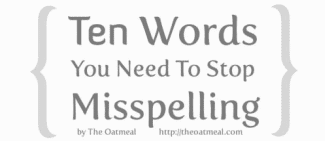
http://theoatmeal.com/comics/misspelling
Ten Words You Need to Stop Misspelling
By The Oatmeal
Lose
Opposite of win
Loose
Not tight
Pretend the extra O is a hemmorrhoid on the word. Hemorrhoids are never tight.
Weird
e then i.
Remember it like this:
We ... ir ... d = We ... are (ir) ... dangerous (d) to those dumb, dirty dolphins.
Not wierd
Every time you spell it this way, a dolphin gets run over by a jet ski.
Their
Their is possessive, meaning it owns something.
[Man] I hate our new neighbors. Their cow keeps eating the leftover casserole.
In this case, their is referring to the neighbors who own a cow.
They're
They're is a contraction for "they are."
[Man] They're gonna get a shovel to the face unless they get that cow under control. No one eats my casserole.
In this case, they're means "they are."
There
There refers to a place or idea. Use this form if you're unsure.
[Man] Look over there! An alien just burst out of that cow's chest!
In this case, there is referring to a location.
It can also refer to something more abstract: There are many reasons to discipline a cow. For starters, a cow who eats rancid casserole will later become a host for alien parasites.
[Monster] Abstract usage! I love it!
Your -- You're
These both use the same rules as "their" and "they're."
Your is possessive. In other words, you own something.
Your new baby alien loves to cuddle, but he keeps crapping in your refrigerator at night.
This is referring to your alien and your refrigerator.
You're is a contract of "you are."
You're definitely cleaning out the fridge tomorrow morning, assuming that little beast can't keep his bowels in check.
This translates to "you are definitely cleaning ..."
It's
This is a contraction for it is or it has.
If you can replace it's with it is or it has, then use it's in your sentence.
For example:
It's not fair that Randy gets to ride a wolverine to school, but I have to ride this stupid manatee!
Its
This is indicating possession.
Use this when one thing owns another.
For example:
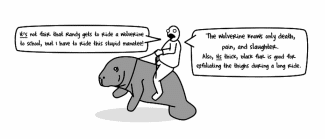
The wolverine knows only death, pain, and slaughter. Also, its thick, black fur is good for exfoliating the thighs during a long ride.
Using "it's" in this case would result in:
"Also, it is thick black fur is good for ..." which is wrong and anyone that does this deserves to be mauled by a wolverine.
Definitely
There is no A in "definitely."
To help you remember, use this:
If you put an A in "definitely," then you're definitely an A-hole.
Effect - Affect
Most of the time effect is a noun and affect is a verb.
If you're unsure, try substituting a different verb and see if it works.
As a child, he was affected by his parents. As a child, he was eaten by his parents.
A verb works here so you should use "affected."
[Man] C'mere, Randall I want to ingest you, just like I did your obnoxious parakeet.
[Man] You ate him?!! But he sang only of love and beauty! You're a monster, Dad!
Weather
Snow, rain, sunshine, typhoons. All that crap
I'm the sun, I make super happy sunshine!
Also, one day I'll explode and burn you all alive like the miserable little sausages that you are!
Whether
Whether is used in this way: Your correct usage of this word will determine whether or not I kick you in the hemorrhoids.
Nothing gets a point across like a solid kick to the hemmies.
A lot
Always leave a space here. Remember, there's a lot of space in outer space.
Alot is not a word.
You don't write alittle, abunch, acantaloupe, aporkchop. So don't write alot.
Then
is used for time.
First I stole a panda bear, then we drank malt liquor together.
The sequence of actions indicates time; first stealing the panda, and then drinking.
Than
is used for comparison.
I'm much better at holding my liquor than a panda bear.
This is comparing a panda's drinking ability with your own, so you should use "than."
The End
Written and Drawn by The Oatmeal
***
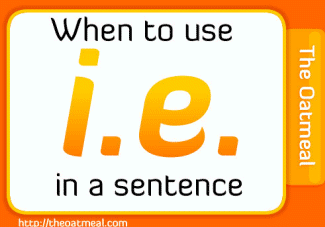
When to use i.e. in a sentence
Ever done this?
"When eating a squrrel taco, Bigfoot always adds extra condiments, i.e., ranch dressing."
This is wrong!
[Bigfoot] Oh drats! I've been using it wrong AND I'm out of ranch!
i.e. is an abbreviation for a latin phrase meaning "that is."
It's not used for listing examples; it's used for clarifying a statement.
Think of it as "in essence" or "in other words."
By using it above we're declaring that ranch dressing is the only condiment in existence, which is false.
[Bigfoot] Sure is! They forgot alligator dung and yak's blood!
In the previous example we should have used elg., which means "for example."
So when should I use i.e.?
Use i.e. when you want to explain what you just said in a different way. A definition, metaphor, or clarification can follow.
For example:
"The best way to take out a unicorn is with a Claymore, i.e., a directional mine which explodes shrapnel into a designated kill zone."
Ideal configuration for blasting a unicorn into unrecognizable bits.
Another example:
"Eating a squirrel taco without any ranch dressing is like playing leapfrog with a unicorn, i.e. a very bad idea."
[Man] Here I come, tee-hee! weeeee!
An example of e.g.
"I love eating meat whose ingredients are a mystery, e.g. bologna, hot dogs, and spam."
In this example we used e.g. because it is not a finite list; other mystery meats are out there.
[Man] Thank God for that! I couldn't imagine a world without mystery meats! It'd be like a world without shiny mustaches: sad, cruel, and empty.
Another example of e.g.
"Women love admiring furry objects (e.g. koalas, armpits, and unkempt back hair).
[Man] How serendipitous! It just so happens I've got all three!
Should I use parentheses or commas?
(e.g. stuff here)
(i.e. stuff here)
,e.g., stuff here
,i.e., stuff here
Both are acceptable.
Do I need a comma after the e.g. or i.e.?
Most style guides recommend that you use a comma.
[Man] "On Thursdays, I always wear my most expensive pair of pants, i.e., the ones made from rubies and panda bears."
In this example we use i.e. because it IS a finite list; the character only has one most expensive pair of pants.
In conclusion
e.g. = examples
(think "egg xamples")
i.e. - clarification
(think "in essence")
The End
Created by The Oatmeal
***
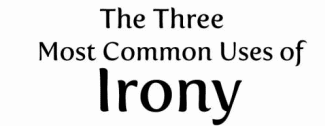
The Three Most Common Uses of Irony
Verbal & Dramatic Irony
Verbal irony is when a speaker says one thing but means another.
[Man] Sure, I'd love to go crawl inside that rotting goat carcass and find your missing wallet.
In this example, he's not particularly keen on crawling inside the dead goat.
According to some literary experts, sarcasm is a form of verbal irony. According to others, it's not. The definition and usage of verbal irony is not important to remember; what is important to remember is that while these people are arguing back and forth about it, the rest of us are doing more interesting things like eatin fried foods, stargazing, and riding jet-skis.
Dramatic irony is used in a narrative when an event occurs whose significance the audience understands but the characters do not. For example, in Romeo and Juliet when the characters think that Juliet is dead but the audience knows she's only been knocked out by a sleeping potion. Or this scene from my upcoming feature film, Mayonnaise Volcano Warriors. *
[Man 1] I dunno dood, that looks really hot.
[Man 2] It's not! It's just brightly lit mayonnaise mixed with orange food coloring! Don't be such a boob -- jump in and have some fun!
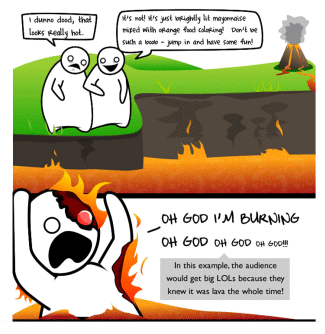
[Man 1] OH GOD I'M BURNING. OH GOD. OH GOD. OH GOD!!!
In this example, the audience would get big LOLs because they knew it was lava the whole time!
*Mayonnaise Volcano Warriors is not actually an upcoming feature film.
2. Situational Irony
Situational irony is when something happens and a reversal of expectations occurs. The key is the reversal. For example:
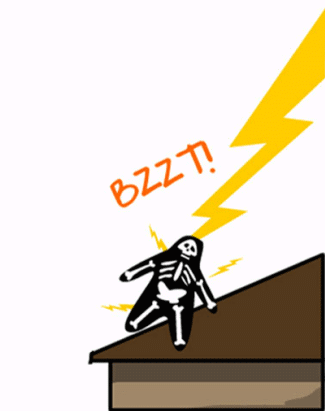
[Man] Every time there's a lightning storm, vicious sea-bears come in from the pacific ocean and launch an attack. Luckily during tonight's storm I'll be wearing this suit of armor as protection, AND I'll be standing on the roof so I can see them coming!
The reversal: the armor, which was intended for protection, is what ended up causing harm.
[Bear] Hey, that's not ironic! The Oatmeal is an idiot!
Think so? Keep reading.
Not Ironic:
"It's like ten thousand spoons when all you need is a knife" -- Alanis Morissette's "Ironic"
Why isn't it ironic? It's just an unfortunate scenario; there's no reversal of expectations.
Although one could argue that by having so many spoons you'd expect there to be at least one knife lying around, which qualifies as a reversal of expectations. This obnoxious argument is the very essence of irony. Read on to see what I mean.
Ironic:
This was posted on my facebook wall.
Love your site! I am a stickler for grammar, punctuation, and spelling, not hard to understand yet some people still don't get it ... glad your educating the minions ...
Why is it ironic?
Right there is why.
Having read my grammar comics and being a self-proclaimed grammar stickler, you'd expect this person to know the proper usage of your.
[Man] Okay, that's DEFINITELY not ironic. Oatmeal, what kind of strawberry-scented crack are you smoking today?
Don't think the above situation qualifies as irony? This brings me to my next point ...
Last but not least,
The most common use of irony!
1. Inspiring annoying arguments!
If anyone refers to anything as being ironic, the hip thing to do right now is to call it out as not being ironic.
Most common uses of irony
Making a point by deliberately saying things that are incongruent with the truth. (i.e. sarcasm)
Making social commentary
Inspiring massive threads of raging idiots on the internet to debate whether something is ironic or not.
Situational irony is difficult to define and there's a lot of room for interpretation as to whether a particular situation qualifies as ironic or not. It's subjective, confusing, and it depends on the expectations of either the reader or the characters in the situation.
All the examples of irony I've used in this comic are debatable as being ironic, and conversely many situations which are not considered ironic, such as those found in Alanis Morisette's Ironic, could be considered ironical.
It all depends on the storyteller, the characters, and how obnoxious the listener feels like being that day.
[Man 1] So I heard about this guy who stepped out of the way to avoid getting burned by someone's cigarette only to get sucked into a jet engine and was blasted to smithereens! It was really ironic.
[Man 2] Uh, excuse me -- yeah so technically that's not ironic because the heat from the jet engine isn't what killed him, the blades did. It would only qualify as irony if he was burned by the engine. Just FYI.
[Man 3] So what's it like being a virgin at your age?
In other words,
don't debate irony.
If someone misuses it, you probably knew what they meant and you're just sharpshooting their example to make yourself look smart. Instead, shut your useless pie hole and go find something better to do.
[Mouse] Is your trucker hat ironic? Does a dolphin wearing a life jacket qualify as irony? What if a dolphin befriended a tunafish on facebook? Ironic, yes or no? Please explain!
[Man] Who gives a shit! NOW DROP ME A HIGH-FIVE MR. OVERSIZED CHINCHILLA!
THE END!
SLAP!
***
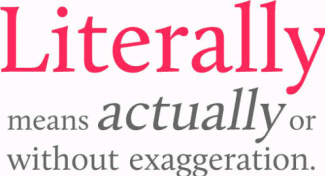
http://theoatmeal.com/comics/literally
Literally means actually or without exaggeration.
When you say "I literally ...," it means you're describing something exactly as it happened; you are being literal.
So, if you were to say:
[Man] Excellent joke! I LITERALLY pissed myself laughing!
This is what you are implying:
[Man] Excellent joke! A large urine stain has formed on my pants!
Or, if you said:
I LITERALLY got your back, bro.
This is what you are implying:
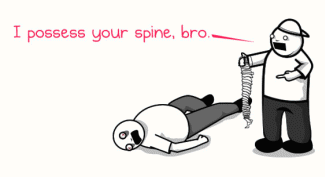
I possess your spine, bro.
The {thankfully} late Jerry Falwell provided this quotation before his death in 2007:
"If we do not act now, homosexuals will own America! If you and I do not speak up now, this homosexual steamroller will literally crush all decent men, women, and children who get in its way ... and our nation will pay a terrible price!"
